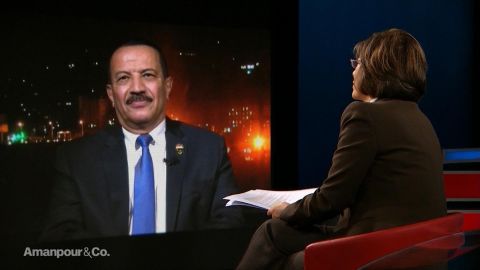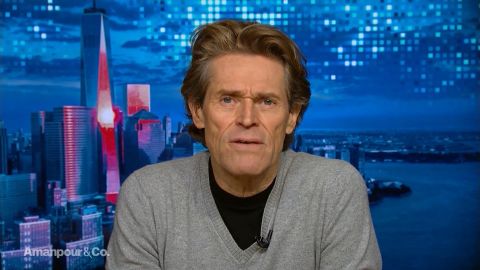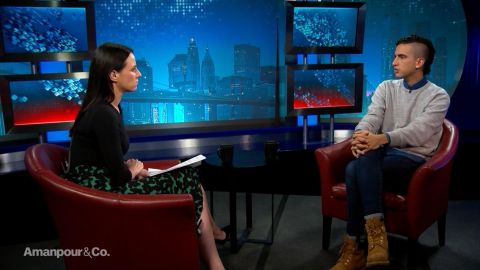Read Transcript EXPAND
CHRISTIANE AMANPOUR: The picture painted of the online world is not always pretty, trolls and keyboard warriors. We’re advised to ignore the haters, but our next guest decided to take them on.
(BEGIN VIDEO CLIP)
DYLAN MARRON, HOST, “CONVERSATIONS WITH PEOPLE WHO HATE ME”: Hi. I’m Dylan Marron. And I’m starting a new podcast called “Conversations with People Who Hate Me.” It’s an interview series where I get to know some of the people behind the negative and hateful of messages I’ve received on the internet.
(END VIDEO CLIP)
The point in Dylan’s words, remember there’s a human on the other side of the screen. Dylan Marron a writer, performer and digital creator, examining the tense interface between race, sexuality and privileged. He told Alicia Menendez why he believes empathy is not indorsement.
ALICIA MENENDEZ, CNN CORRESPONDENT: So, here’s a part of your story that I have never gotten a clear answer on, which is —
MARRON: Right.
MENENDEZ: — you’re trained as an actor but you’ve really made a name for yourself making digital videos that are much more and acted as they. How did you make that jump?
MARRON: I was an actor all through high school. I got to college, I joined a sketch comedy group and I loved it. I loved this idea of working with a group to satirize your community, to write stuff for yourself. I think from there, I start — I wrote a full-length play with a friend of mine. We got some opportunities to perform it here in New York. I joined a theater company called “The New York Neo Futurists.” Here, I was with them for four years. And then, with all the stuff I was doing there, I was kind of naturally evolving into talking about social issues through my work. So, I wanted to translate that from the stage to the internet, and that’s what I did.
MENENDEZ: So, then, how did you make the jump from that to social justice videos?
MARRON: Well, so, I guess the first video series I started doing that really took off was “Every Single Word.” It’s a video series where edit down popular films to only the words spoken by people of color.
MENENDEZ: They’re short videos?
MARRON: Very short videos, like tragically short. And it’s speaking the language of the internet, right. It is — it’s ultimately a supercut and a lot of people found it super funny. Of course, through the humor there is also something else being said. These characters are only peripheral, do these characters have any names, can you understand the story — the larger story of the movie if you only see the lines spoken by these people of color. And so, that kind of took off and I realized that the internet was this really wonderful way to talk about very complex issues if you could challenge yourself to distill it into very — into a more simple output.
MENENDEZ: And for your next series, you put yourself in the video?
MARRON: Yes. The next big series after that is — was in response to the (INAUDIBLE) bathroom bills that were gaining media attention around the United States. And I wanted to humanize the like very people at the center of this issue rather than just having pundits, you know, like consider this. So, I started a series called “Sitting in bathrooms with Trans People.” We talked about super Monday and stuff, you know, like just who they are, snacks they liked. We also talked about things like transitioning only as long as my guests were comfortable with it. But the main point of it was to just say like hate grows from fear and fear grows from not knowing.
MENENDEZ: My question with that series and then with your series “Unboxing” where you take, you know, sociological phenomenon —
MARRON: Yes, yes, yes.
MENENDEZ: — and really debunk them —
MARRON: Yes.
MENENDEZ: — is, are the people who are scared or are the people who don’t understand this issue the way that you might understand it watching not and are they being persuaded by that content?
MARRON: So, that was a real thing I had to wrestle with. I think when I was making those series, I truly thought I am reaching all the people that I need to reach, because you just see a number and sometimes you see these enormous numbers and you see it growing. So, you think that you are reaching all the people you need to reach and you are think you are drastically changing minds by sharing these truths that are truths to you on the internet. I quickly learned that was not the case.
MENENDEZ: How?
MARRON: Through comments and messages. And first, with the like deluge of negative comments. I want — I just ran away from it, right.
MENENDEZ: Can you give me a sense of what those — I mean, as someone who has an Gmail folder that’s called hate mail —
MARRON: Yes, yes.
MENENDEZ: — that has lots of mail in it —
MARRON: Yes.
MENENDEZ: — what’s the type of mail that you get?
MARRON: So, just a lot of people calling me a faggot. People disagreeing with my take on social issues and a lot of people telling me I was cancer, right, that that kind of terminology used to describe people who talk about social justice on the internet.
MENENDEZ: Did that hurt or were you able to just dust it off?
MARRON: It totally hurt. Yeah, it totally hurt. Clearly, I was getting many people from the right who more identified as conservative. But I was also getting a bunch of fellow lefties and that’s — that was, I think, particularly hard to deal with because there’s a box in your mind where you can put a comment from someone you are ideologically opposed to, it’s very, very challenging when you get it from someone who is, in most ways, very similar to you.
MENENDEZ: So, then you make something out of those comments. What is “Conversations with People Who Hate Me”?
MARRON: “Conversations with People Who Hate Me” is my podcast and it’s a show where I call up some of the people who have written negative things to or about me on the internet and we have an extended conversation.
MENENDEZ: What is your objective with the podcast?
MARRON: The sign off line I always end every episode with is, “Remember, there is a human on the other side of the screen.” And I think my objective with the show is to remind people of that. And that means, one for the authors of this negativity, of the fact that the person they’re writing to or about is a human who will maybe read what they have written. But also, for the recipients, to remember that there is a human who has written this. And —
MENENDEZ: That seems particularly important in the internet age. I mean, you are 30, I’m 35. We grew up on the internet.
MARRON: Yes.
MENENDEZ: So much of our ability to interface —
MARRON: Yes.
MENENDEZ: — with one another is —
MARRON: Yes.
MENENDEZ: — informed by the way we speak to each other online.
MARRON: Yes.
MENENDEZ: I mean, do you think this is unique to the time we are living in?
MARRON: I do, I do. The kind of like monitor I’ve established for myself or the show is that empathy is not endorsement. And what I mean by that is, just by acknowledging the humanity of someone else does not mean you are immediately cosigning everything that they believe, everything they think, their political ideology. But I do think it is important to see each other as human. I’m not saying we should give the most dangerous ideologies room to grow, right. But I do think it is valuable to acknowledge that those ideologies grow in humans and those humans were once babies, you know, and they were shaped by all of the things that we humans go through in life and there is value in — only as people feel they have the ability to do so.
MENENDEZ: Let’s talk about the first episode.
MARRON: Let’s talk about it.
MENENDEZ: When you decided to con man named Chris. He had written some hateful messages on a video you posted about social justice. Let’s take a listen.
(BEGIN VIDEO CLIP)
MARRON: So, I don’t want to put words in your mouth, so correct me if I’m wrong. I was kind of like the image of the social justice warrior, right?
CHRIS: Right, right.
MARRON: And how would you define a social justice warrior? Don’t worry I won’t be offended.
CHRIS: To meet, a social justice warrior is a — for the most part, a rich college student who has his parent, mom and daddy, pay for everything and they pick and choose these subjects to be angry about in a world where people really generally don’t have that much to be angry about.
(END VIDEO CLIP)
MENENDEZ: What did you take from that conversation?
MARRON: The like real kick in his messages that he had called me a piece of (bleep). And, you know, my take away from that is it is so easy to feel angry, furious, to feel hate for someone from afar. And it is so hard when you’re on the — it is harder when you’re on the phone with that person, right. And so the ability to talk to a human who sent me a message like that kind of put me at ease and from or my relationship with Chris, I think that it put him at ease as well, right. It’s just — it’s easy to talk about — meaning I’m putting myself in Chris’s shoes, I can imagine it is easy for him to talk about the hate of Social Justice Warriors, SJWs as we are known on the Internet. It’s kind of more difficult to define that to the person who you’re labeling as an SJW when you’re on the phone with them.
MENENDEZ: I understand what that means for you and I understand what that means for Chris. What do you think it means fearless? Where does it take them?
MARRON: Great question. I know that many people listened who have politically divided homes and it gives them a little sense of hope for how they can communicate with family members who don’t agree. I know others — you know, we do have a good number of conservative listeners too. It’s not the majority but there are who feel hopeful that this is what conversations can sound like. What I’m always really, really careful to say is that this is not a prescription for activism. You know what I mean? I’m not saying that everyone must now call their online detractors and then the world will be a better place.
MENENDEZ: No, in the country, there are definitely activists who take a very different stance than you know —
MARRON: Very different.
MENENDEZ: — and I think have some legitimate concern that by giving a platform to people who come from a place of hate in some cases, who come from a place of extreme bias that even you often say empathy is not an endorsement but I do wonder if it is legitimization.
MARRON: Well, currently in this moment, I really do believe that conversation is crucial to have. I did not invent these dangerous ideologies. I also don’t believe that by ignoring these dangerous ideologies that you are doing any service to understanding nuance and complexity of what it means to be human. I also know that if that quote is then taken out of context, then people will apply it to what they believe to be the most dangerous thing. And then I think it’s, of course, a little misleading that the word hate is in the title because what I’m referring to is the kind of innocuous hate, hate that is written online every day that we see our friends write.
MENENDEZ: In addition to speaking to people who have given you negative comments, you also bring people together. In one episode which we’re about to listen to, you bring together Emma Sulkowicz, a rape survivor who was very public on Columbia’s campus with Benjamin, a person who has called Emma a liar.
(BEGIN VIDEO CLIP)
MARRON: The reason we’re here and the reason we’re on this call is that Benjamin, a few years ago, you wrote Emma a message with very few words. You just said, “You are a liar.” Emma, how did it feel to receive it?
EMMA SULKOWICZ, RAPE SURVIVOR: Honestly, it wasn’t even just Benjamin’s message individually that hurt so much. It was the torrential outpouring from the internet of these kinds of messages into my lap.
MARRON: Well, I apologize for the hurt. I do sincerely apologize for that. I know it might sound trite. That wasn’t my intention but I don’t apologize for the disagreement. You became a very public person, right. And you didn’t — from everything that I could see, you didn’t shy away from the public eye either. Maybe some messages should be expected. And I didn’t — you know I would never say like any death threats or anything like that. I’d never do that. I hope that on the spectrum, it was a rather a benign one.
(END VIDEO CLIP)
MENENDEZ: You’ve said this is one of the most challenging episodes that you’ve done. What about this was challenging for you?
MARRON: Well, this is taking a conversation online that is incredibly difficult and trying to give it space to breathe offline. We are seeing, you know, with a movement that I fully stand by as an ally which is the Me Too [13:35:00] movement, we are seeing a lot of survivors bravely come forward as being survivors of sexual assault. And when we have these conversations online about the importance of believing survivors, that’s one thing because I think we are — and because we have to, we’re using talking points and we’re using hashtags and that is crucial for online communication. What’s complicated is when you get offline. And, you know, this was — and this is a very specific case, meaning I think it’s important to only speak about the specifics of the dynamics between these two people, Emma and Benjamin. And Emma, you know, Emma was thrust into the public spotlight and then a stranger who found his way into Emma’s is inbox with a message that said, you know, “You are a liar”, I think what we’re talking about here is the disbelief that some people have when rape survivors come forward. And the demand for forensic evidence when that is itself an incredibly complicated topic. I think this was challenging because my job is to make sure that all the people on the call feel safe. I needed to make sure that Emma felt safe talking about this. And also if Benjamin didn’t feel comfortable with how the call went, the episode wouldn’t have gone out. But I think my job is creating a safe space for all of my guests including Benjamin and —
MENENDEZ: Is it your job to hold them in equal weight?
MARRON: Well, I don’t know that it’s important to hold, one, a human’s account of what happened to them in equal weight to a stranger who’s denying that that ever happened to them, right. A stranger’s suggestion that what they say happened to them didn’t happen. I don’t think it’s about holding those two things in equal weight. But what I do think my job is, is holding the fact that these are two human people, two human people who were once born, you know, and went through a whole bunch of experiences and communities that shaped who they are today. And that is what has caused them to intersect on my show.
MENENDEZ: Thanks so much.
MARRON: Yes. Thanks for having me.
About This Episode EXPAND
Christiane Amanpour speaks with Yemeni Minister of Foreign Affairs Hisham Sharaf Abdullah and actor Willem Dafoe. Alicia Menendez speaks with Dylan Marron, host of “Conversations with People Who Hate Me.”
LEARN MORE


